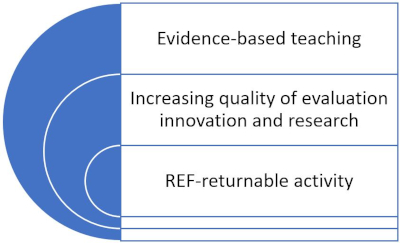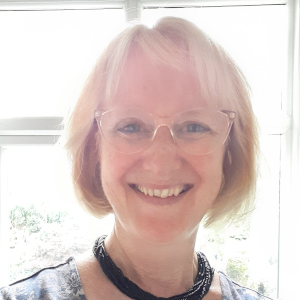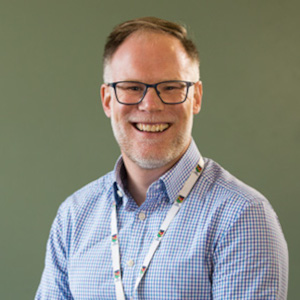Welcome to a School of Medicine Faculty Research Theme (FReT)
Health professionals education research
Our mission is to be a leading centre in the UK for education research, innovation and scholarship in the health professions and for Keele’s evidence-based, theory-driven, educational innovation to enhance the quality of healthcare education and provision locally, nationally and globally. We will achieve this by developing a critical mass of educational researchers within a supportive community of practice, which enables teachers and academics across the faculty to study their own educational practice and innovations.
Our work ranges from locally-focused scholarship which aims to enhance quality at Keele through theory-informed teaching, through to collaborative externally-facing research which aims to impact education theory and practice internationally. Much of our work focuses on understanding and developing our curricula to further ensure that Keele graduates are prepared to deliver excellent care to patients and service users within their future roles. Our projects range from pragmatic evaluation of innovations to research, which generates new theories with global relevance.

Our aim is to be inclusive, for anyone who works or studies at Keele, or external partners. If you would like to join the Health Professionals Education research theme at Keele, please contact us.
Health Professionals Education Research in the Faculty of Health and Medical Sciences is led by Professor Janet Lefroy with Dr Peter Yeates as deputy lead, along with a board drawn from all Schools in the faculty.

Janet Lefroy, Professor of Medical Education
Since 2007, Janet has lead an action research team developing the consultation skills curriculum at Keele University School of Medicine. Publications cover development and validation of the Generic Consultation Skills instrument and strategies for improvement, its usefulness in app-form for workplace assessment and feedback, the impact of including grades in the feedback, and how students might benefit from reflection on their feedback.
Read more
Peter Yeates, Senior Lecturer in Medical Education Research
Peter’s research focuses primarily on assessment and feedback within health professionals’ education. His doctoral work (2009-12) contributed to the formation of the field of assessor cognition, and he has subsequently studied the influence of a range of influences and biases on examiners’ judgement. His recent research has focused on developing and testing technology-enhanced assessment methods, including video-based feedback, video-based examiner benchmarking and exploratory work into the use of computer vision and artificial intelligence to measure aspects of trainees’ communication skills.
Read moreHealth Professionals Education and Scholarship FReT- ways to connect across FMHS

Themed forum meetings
A chance to meet, share completed scholarship or research on a key theme:
- Novel forms of teaching
- Simulation and placement learning
- Assessment and feedback
- Inter-professional education
- Equality, diversity and inclusion

Ideas cafes
- Monthly informal drop-ins on the HPE FReT Teams channel
- Perfect for networking
- Bring your educational scholarship or research problems in search of a solution
- Find research partners to collaborate with from across FMHS

HPE FReT Incubator meetings
- Face to face every two months
- Present your educational scholarship and research plans
- Supportive peer review and advice at any stage of development
- Usually two projects are discussed at each meeting
Assessment and feedback
Our Assessment research covers a diverse range of topics including research on assessors’ cognition /judgement processes; technology-enhanced assessment methods, including NIHR-funded research on Video-based Examiner Score Comparison and Adjustment (VESCA) and Video-based Examiner Benchmarking (VBB). Further assessment research has determined approaches to consultation skills assessments, resulting in the development of the Generic Consultation Skills Assessment framework (GeCoS), studied the feasibility and implications of patient involvement in assessment, and has investigated assessment standard setting approaches through both psychometric modelling approaches and qualitative observational research, including multi-centre commissioned research for the Medical Schools Council Assessment Alliance (MSCAA).
Our research on feedback has included a range of research on the format of feedback, including the implications of quantitative grades within formative workplace assessment, strategies for providing feedback, development and testing of technology-based approaches to enable examiners to provide quality feedback within performance assessments and students interaction with and use of post-exam feedback. Current work is investigating the role of video-based feedback to students on their OSCE performances.
People involved in assessment and feedback research: Janet Lefroy, Katie Maddock, Peter Yeates, Bob McKinley, Natalie Cope, Alice Moult, Giles Roberts, Catherine Stephenson
Simulation and technology-enhanced learning
Our research on simulation has focused on computer-based simulations, such as virtual patients and augmented reality applications which support the education and training of both undergraduate and postgraduate healthcare students.
Our research on technology-enhanced learning covers a range of technologies. This has included the use of clicker technology in problem-based learning to improve peer instruction and student engagement, the effectiveness of flipped-classroom-style learning and the use of Values Exchange as a tool to aid ethical decision making. There is a range of currently ongoing research. A large proportion of this is focusing on the use of technology throughout the COVID-19 pandemic, including teaching healthcare students online via MS Teams and the development of their skills, knowledge and professionalism. Further current work includes an evaluation of an online shared-decision making e-learning package for use by healthcare professionals.
People involved in simulation and technology-enhanced learning research: Jessica Thompson, Katie Maddock, Simon Jacklin, Jonathan Berry, Russell Pearson, David Morgan.
Selection and workforce
Our research into student selection covers a range of topics. Using the UK Medical Education Database (UKMED) we are researching the role of Access to Higher Education qualifications in widening access to medicine programmes across the UK. In addition, we are also using the UKMED dataset to investigate whether there is differential attainment, based on applicant demographics, in multiple mini-interviews (MMIs) taken across the UK to select students for medicine. Our research also focuses on numeracy skills in applicants to medicine and subsequent performance in numeracy-based skills and prescribing.
We have researched healthcare professionals’ experiences of transition from student to professional in the clinical workplace, and medical school influences on career decision-making.
Since the start of the COVID pandemic, we have collaborated across faculty in an ongoing study of the training of healthcare professionals to be ready for practice in an era of social distancing.
People involved in selection and workforce research are: Eliot Rees, Janet Lefroy, Bob McKinley, Ruth Kinston, Natalie Cope, Alice Moult, Adam Winterton, Sarah Aynsley, Simon Jacklin, Jessica Thompson, Nageen Mustafa, Kate Diggory, Julia Farrington, Claire Stapleton, Jess Bialan, Gordon Dent and Andy Spencer.
Additional research topics
Further research topics pursued by individuals include communication skills; patient experience and involvement; peer learning; gamification of learning; transitions of learners between career phases; decision making; education in general practice; humanities in health professionals education; Inter-professional education; and placements. Please see the People section for details of individuals pursuing these topics.
We support this work through a series of events throughout the course of each academic year. These include:
Themed forum meetings
These meetings bring together FReT members from all the schools in the faculty to discuss either completed scholarship or work in
- Novel forms of teaching
- Healthcare student placements (both simulated and in the healthcare setting)
- Assessment and feedback to students
- Inter-Professional Education
- Equality Diversity and Inclusion
Ideas cafés
These are monthly informal drop-in sessions in the FReT Teams channel, designed to facilitate regular contact within the business of
FReT Incubator meetings
These are face to face meetings held 6 times per year (approximately every 2 months) at which educational research and scholarship
Away day meeting
This is an annual event featuring external speakers and showcases of completed research, providing a fascinating cross section of health
In addition to these FReT events, there are regular education research and scholarship meetings within the school in the faculty. Details of how to be added to mailing lists for these events are described below:
Health Professionals Education Research is overseen by a cross-faculty board that represents the four schools in the Faculty of Medicine and Health Sciences:
- Janet Lefroy, School of Medicine
- Peter Yeates, School of Medicine
- Clare Corness-Parr, School of Nursing and Midwifery
- Jessica Thompson, School of Pharmacy & Bioengineering
- Desiree O'Leary, School of Allied Health Professions
Take a look at our Members page for more information on membership and a list of our Keele members.

